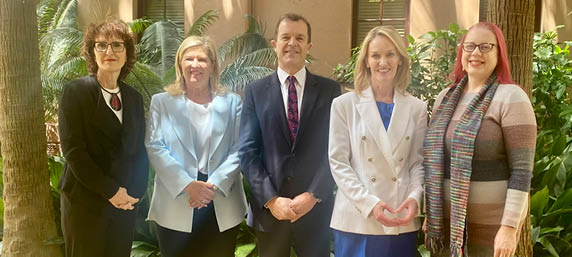The NSW Government’s landmark coercive control bill has overcome its final hurdle, passing Parliament after two-and-a-half years of “unprecedented” community consultation and inquiries.
Attorney General Mark Speakman pushed for the swift passage of the reforms through Parliament after introducing them to the Legislative Assembly in October. On Wednesday the legislation passed, securing NSW’s place as the first Australian state of territory to create a stand-alone offence for coercive control.
However, the changes will not be immediate. There will be an extensive implementation period of at least 14 months, and it will be up to 19 months before the laws commence, to allow “plenty of time for training, resourcing, education and raising community awareness”.
After this point, it will be an offence to carry out repeated abusive behaviours to current or former intimate partner with the intent to coercive or control, and this offence will carry up to seven years in jail.
“Our extensive consultation has included a public discussion paper in 2020; an extensive parliamentary inquiry by the Joint Select Committee on Coercive Control; a public exposure draft that received almost 200 written submissions; targeted consultations on cabinet in confidence exposure drafts; and almost 30 stakeholder roundtables,” Speakman said.
“This unprecedented engagement has allowed us to make careful adjustments to ensure we have the best possible laws to tackle this form of domestic terrorism.
“Domestic abuse isn’t just about physical violence. Perpetrators of domestic abuse also use physical, sexual, psychological and financial abuse to hurt and control their ‘loved one’. Sadly, this behaviour is a known precursor to domestic violence deaths.”

Domestic Violence NSW said it was pleased to see that many of the review provisions it advocated for were approved by the NSW Government, including the implementation of an independent taskforce to ensure services are adequate to support victim-survivors.
However, the move has been criticised by domestic violence advocates and Indigenous legal services, who have said that the legislation could enable perpetrators of violence to find loopholes.
But Minister for Women’s Safety and Domestic Violence Natalie Ward, who chaired the Joint Select Committee on Coercive Control, said the laws achieve radical reform in a “carefully calibrated way”.
“We are immensely grateful to the many witnesses who courageously provided evidence to the Joint Select Committee on Coercive Control and helped shape these landmark reforms,” Ward said.
“Our community has grieved with the families of too many domestic violence murder victims where the precursor was abusive behaviour that stripped away autonomy and human dignity.
“These reforms will drive societal change to make sure we protect our most vulnerable and provide an avenue to justice for those who need it most.”
The NSW Government has committed an additional $69.6 million in this year’s Budget for services that support victim-survivors of domestic and family violence, and minimise the trauma experienced during legal proceedings.




